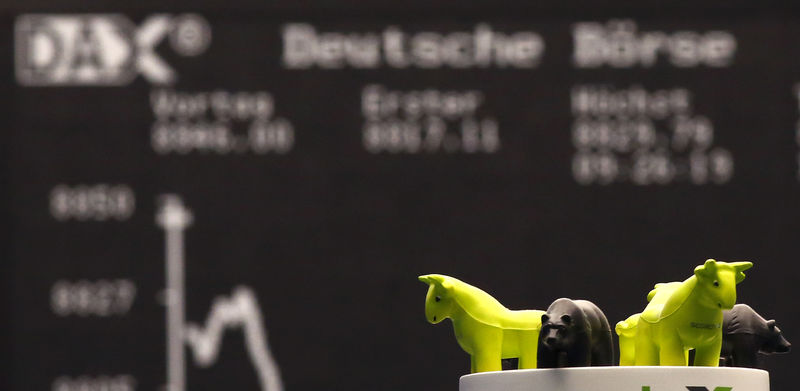This post was originally published on this site

Investing.com – European stock markets fell sharply Thursday, starting the new month on a negative note as investors fretted about the combination of tightening monetary policy and slowing global growth.
By 04:00 ET (08:00 GMT), the DAX in Germany traded 1.1% lower, the CAC 40 in France fell 1.3%, and U.K.’s FTSE 100 dropped 1%.
German retail sales came in ahead of expectations earlier Thursday, posting their biggest jump in six months in July and rising 1.9% in real terms, comfortably ahead of analysts’ forecasts for another drop of 0.4%.
In year-on-year terms, the decline in sales narrowed to 2.6% from 9.6% in June, also ahead of expectations.
However, this could well be the result of a COVID-free summer tourism season, and could well be an isolated bright spot with German factory activity, a major growth driver in the Eurozone, falling further into contraction territory in August.
Additionally, the European Central Bank, along with the Federal Reserve and the Bank of England, is set to press ahead with interest rate hikes to combat inflation at historic levels.
Data on Wednesday showed Eurozone inflation hitting a new record high, rising to 9.1% on an annual basis in August.
Germany’s central bank head called Wednesday on the European Central Bank to act “decisively” to bring down inflation, and an increase of 75 basis points at next week’s policy meeting is now largely priced in.
Data from a private survey released in Asia earlier showed Chinese manufacturing activity shrank in August, as COVID lockdowns and a drought-driven energy crunch weighed on industrial activity in the world’s second-largest economy and major regional growth driver.
In corporate news, Reckitt Benckiser (LON:RKT) stock fell 4.8% following the announcement that Chief Executive Officer Laxman Narasimhan will step down at the end of the month to pursue a new opportunity in the U.S.
Rio Tinto (LON:RIO) stock fell 2.7% after the miner agreed to buy out Turquoise Hill Resources (TSX:TRQ) in a deal valued at about $3.3 billion. Rio already owns a 51% stake, while the deal ends almost six months of takeover talks and comes just two weeks after Turquoise Hill rebuffed a lower offer.
Oil prices weakened Thursday, after registering a third monthly decline in August, the longest losing streak since April 2020, as fears that slowing growth will hit global demand have outweighed a sizable draw in U.S. crude stockpiles.
Data from the U.S. Energy Information Administration showed a bigger-than-expected drop in crude inventories last week, falling by more than 3 million barrels, while gasoline inventories fell for a fourth straight week.
By 04:00 ET, U.S. crude futures traded 0.9% lower at $88.73 a barrel, while the Brent contract fell 0.9% to $94.81. Both benchmarks slumped around 5% last month, falling by more than 20% in the three months through August.
Additionally, gold futures fell 0.6% to $1,715.35/oz, while EUR/USD traded 0.3% lower at 1.0032.

